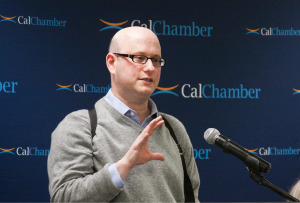California’s budget is experiencing a surplus, but massive uncertainties loom and fiscal prudence must be maintained, California Finance Director Michael Cohen explained yesterday during a luncheon at the California Chamber of Commerce. Highlights of the presentation are included in the latest CalChamber Capitol Report video.
On Tuesday, Governor Edmund G. Brown Jr. proposed the final budget of his gubernatorial career proposing to spend a record $190 billion without raising taxes and setting aside $13 billion in a rainy-day reserve.
Cohen touched on four significant areas of concern to the business community: the rainy day fund, higher education funding, court funding and long-term infrastructure planning.
Filling the Rainy Day Fund
The 2018–19 proposed budget fully fills the rainy day fund to 10% of tax revenues, Cohen explained.
CalChamber-supported Proposition 2, approved by voters in 2014, established a constitutional goal of reserving 10% of tax revenues in a rainy day fund.
By the end of the current (2017–18) fiscal year, the state’s rainy day fund will have a total balance of $8.4 billion, or 65% of the constitutional target. The budget proposes a $3.5 billion supplemental payment in addition to the constitutionally required transfer to the rainy day fund for 2018–19. The two payments would bring the total rainy day fund to $13.5 billion.
Cohen reminded the group that as the state entered the great recession under Governor Arnold Schwarzenegger, the state had only $1.5 billion in a rainy day fund that was pulled out just before the markets collapsed.
“Basically we tried to handle that recession without any money in the bank,” Cohen said. “We are trying to change that so when the next recession does come, we’ll have a chance to either avoid cuts entirely or, more likely, just mitigate the severity of them and maintain as many programs and core services as we can.”
Education Funding
Education funding for K–14 education took a sizable hit during the recession, but school funding has increase by 66% since 2011, Cohen stated.
For grades K–12, the budget proposes to fully fund the Local Control Funding Formula. With $3 billion in new proposed funding for the formula in 2018–19, the budget will achieve full implementation of the formula two years ahead of schedule.
The last few years the budget has been funding career technical education on a limited term basis, but the budget proposes $200 million on a permanent basis and tying it to the community college program created a few years ago, the strong workforce program.
“We think this program has been really successful and this is a much more regional approach to tying industry to the community colleges and we think the K–12 system can successfully link into that,” Cohen said.

Community College Funding
The Governor’s budget also proposes the creation of the first wholly online community college in California. The goal is to target a new group of students that, right now, aren’t well served by community colleges or the rest of the public higher education system. Cohen described these 2.5 million individuals as people in the workforce between 25 and 34 years old, who have their high school diploma but yet don’t have a higher education degree.
According to Cohen, these workers are most vulnerable during a recession, and they are the ones who aren’t getting their income back to the same level it was before the last recession.
The online university will target these students who are already in the workforce who don’t have the same amount of time to dedicate to traditional classrooms. The goal is to develop an entire online system to allow students to get certificates and degrees. Cohen pledged to work with industries to ensure a system is created that reflects their needs so that when students finish their certificates and degrees they have skills that are actually needed in the workforce.
“We want workers who have a pathway to improve economically,” Cohen said.
In addition, the 2018–19 budget proposal allocates a 4% increase for community colleges, a total increase of $570 million that includes a new funding formula which encourages colleges to enroll underrepresented students and rewards colleges for incorporating students’ success in completing degrees and certificates.
Strengthening Transportation Infrastructure
The 2018–19 budget is the first full year of funding under the Road Repair and Accountability Act of 2017 (SB 1), which provides stable, long-term funding for both state and local transportation infrastructure. Cohen said that this act provides $55 billion in new funding over the next decade, split evenly between state and local projects.
There are additional infrastructure proposals; Governor Brown signed two bonds that will appear on the June 2018 ballot. These CalChamber-supported bonds propose $1.3 billion for natural resources and housing projects.
The state has already appropriated the monies, so that—assuming voters approve these bonds—the state is ready to go and get the money on the street as quickly as possible, Cohen said.
Court System Funding
Finally, there is $150 million of ongoing money for the courts. In addition, the budget proposal allocates monies to restart the court construction programs for 10 courthouses statewide. The state’s judicial branch will be provided additional funding to support efforts by the Judicial Council to improve and modernize trial court operations.
Next Recession
In closing, Cohen reminded attendees that balanced budgets had been quickly followed by huge deficits, but the last five years have been a change in practice from a budgeting standpoint.
“We are really doing more multi-year planning, looking ahead and knowing what our future costs will be,” Cohen said. “Above all, to maintain our fiscal prudence, California must be cautious in spending and put money into our rainy day fund.”
The full summary of the Governor’s budget proposal can be found at www.ebudget.ca.gov



